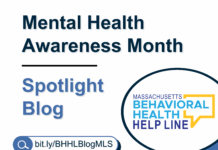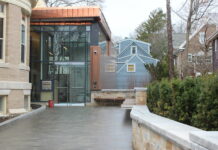In this interview, we’ll hear from Maureen Coleman, Interim Library Director of the Plymouth Public Library, about the library’s Recovery Corner. The Recovery Corner is a valuable library space providing support for recovery from substance use disorder. Maureen shares her insights from the library’s experience with the Recovery Corner including resources provided, meaningful connections with community partners that led to the success of this resource, and advice for libraries to develop a Recovery Corner space.
Please tell us about the Plymouth Public Library’s Recovery Corner
Maureen Coleman: The Recovery Corner at the Plymouth Public Library was started about three years ago. The Recovery Corner aims to provide low-barrier access to information on substance use disorder, treatment options and centers, as well as harm reduction centers and supplies. To build an area that touches on these topics, we have partnered with several community organizations primarily focusing on substance use disorder. These partners have allowed us to incorporate items like children’s books, wellness workbooks, information on treatment options, and treatment centers local to the Plymouth area. We have also been able to incorporate harm-reduction materials like Narcan, Fentanyl testing strips, rescue breathing masks, and biodegradable safe drug disposal kits. To make sure that the Recovery Corner and its associated materials are accessible to the community, we decided to put it on the first floor in the back of our New Book Room using shelving that was easily reached. We chose an area away from the busiest areas of the library to allow community members to get information and supplies without feeling like they were on display. These approaches resulted in optimal usage and accessibility.
What are some innovative ways that libraries can meet the need for resources, programs, and materials for those affected by drug and alcohol use?
Maureen: Libraries can meet the need for resources, programs, and materials for those affected by drug and alcohol use most thoroughly by partnering with community organizations in their area. Some community organizations we have connected with include treatment centers, youth prevention collaboratives, peer recovery centers, and a harm reduction center. Each of these community partners brought something different to the table. We could grow the available materials by leaning into the specific areas these organizations typically handle. The youth prevention collaborative gave us access to children’s books, wellness workbooks for teens, and resource booklets that are helpful to all but specifically for teens. The harm reduction center has provided education on harm reduction and supplies. Many treatment centers have been able to provide information on different treatment approaches and where people in our community can get treatment. We have also relied on the Massachusetts Health Promotion Clearing House website to order free literature and materials.
Another way that libraries can meet this need is to implement programming around substance use disorder. Plymouth Public Library has been a part of an overdose awareness program (We Remember, We Recover) that brought together about 15 area providers and speakers. We made this family-friendly by having crafting stations, games, and a bouncy house! During that event, we had an organization called Drug Story Theatre that came and had teens involved in their program perform a short play that touched on their experiences. We had approximately 150 people attend the event. We are currently working on planning a Recovery Gala that would be open to people within the recovery community, as it can be a struggle to find fun and fancy events that are drug and alcohol-free. This program would be a formal evening/dance. The library spearheaded a donation drive for semi-formal clothes, shoes, and accessories to support this. We had great success with that.
Creating programming has immense power as it brings together the library, the community partners, and the wider community. Creating unique and fun events is an excellent way for libraries to get involved with this work!
In addition to literature, materials, and programs, our community partners have offered the voices of those who have lived experience with addiction and recovery. That is a valuable piece when doing any initiative like this. Hearing from people with experience as to what is helpful or would’ve been beneficial throughout their journey allows us to ensure the Recovery Corner offers materials that speak to all people affected by substance use, including those who are not active or previous users. The materials presented are helpful to those who have experienced or are experiencing a loved one who is actively using or recovering. These materials are also beneficial for any community member looking to learn more about what substance use disorder entails and best practices for all of us when it comes to battling stigma.
How did your community respond to the Recovery Corner?
Maureen: The Plymouth community has been supportive of the Recovery Corner. We have received a lot of feedback from the community. People who are using or in recovery have let us know that it was impactful to see that the library offers this information and supplies in a nonjudgmental and accessible way. Treatment providers have been pleasantly surprised by all the different ways they can partner with the library and what the Recovery Corner offers to the community. One community partner said, “This isn’t your parent’s library!” as a way to touch on the good work we are doing around substance use that has not historically been found in library spaces. The Recovery Corner has prompted conversations with community members about substance use disorder that have been helpful for staff and the community members. I have experienced people opening up and sharing about their journey or about loved ones who have or are struggling. It’s been a community-building resource in that way. Plymouth is lucky that there are so many organizations who are doing so much work in this area that the community and town support!
What advice would you offer to libraries interested to develop a Recovery Corner?
Maureen: The best advice for starting an initiative like this is to identify and connect with area community organizations doing this work. Those relationships lead to others and become key in providing libraries with materials and partnerships that can sustain this type of initiative for the long term at low or no cost. Working together is a way for these organizations to see what the library can offer, whether that be a meeting room, a Recovery Corner, or developing a program. It is also not a bad idea to start small and expand outwards from there. When we began the Recovery Corner, we had a small amount of literature and Narcan. We have added many more resources and materials since the inception of the Recovery Corner and have been a part of some tremendous collaborative programs. I believe we’ve successfully done that by easing into the project. Taking your time to develop a complete plan and cultivate necessary relationships is key to making these types of initiatives successful.
Any final thoughts?
Maureen: I hope more libraries incorporate this type of work and create spaces like the Recovery Corner into their communities. It benefits the library, the community, and the local organizations. My main focus at work is always on outreach and partnerships. I especially enjoy reaching community members who may not see themselves reflected in usual library materials and programs. This has been a great way to do just that. As someone who is in recovery myself, who has lost loved ones and still has loved ones struggling, finding ways to make information on substance use disorder, recovery, and harm reduction available in a low-barrier accessible way is a priority to me. As such, I am always available to talk to anyone about the Plymouth Public Library’s Recovery Corner, substance use disorder, and/or community partnerships that can make these initiatives sustainable and affordable. On that note, I would be remiss not to mention our key community partners, who we are so fortunate to have helped us with this work. I am including my contact information and theirs if someone wants more information!
Learn more about the Plymouth Public Library’s Recovery Center in this YouTube video.
Maureen Coleman
Plymouth Public Library
Michael Kelly
Plymouth COPE Center
Jerry Randall
High Point Hub & Spoke
Hardcore Connections
grandall@hptc.org OR geraldrandall@hardcoreconnections.com
Rodney Brown
Plymouth Recovery Center
Keaghan Callahan
South Shore Recovery Center
kcallahan@southshorerecovery.com
Interviewed by Michelle Eberle, Consultant


